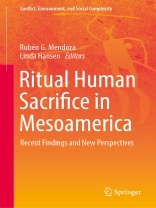This edited volume addresses the environmental and cultural underpinnings of the kind of social conflict that spawned the origins and elaboration of ritualized human and animal sacrifice in Mesoamerica. The chapters variously document the place of cultural evolution and social complexity in the origins and elaboration of ritual human sacrifice, cannibalism, and trophy-taking across a broad spectrum of Mesoamerican cultural and social contexts that first saw the light of day before 2600 BCE, and rapidly developed and proliferated across the Mesoamerican world in the centuries to follow. They study the developments in sacrifice rituals through the centuries into the first millennium CE, when the Mexica Aztec and their allies had elevated ritual human sacrifice such that they produced a plethora of sacrificial acts, modes and manners of death, and associated deities to articulate the necro-cultures and blood-tribute of the times. The chapters further study present-day rites of Amerindian communities from throughout Mesoamerica that include paying homage to the deities of earth and sky through sacrifice and consumption of animal surrogates. The interdisciplinary effort undertaken by this international cadre of scientists, including anthropologists, bioarchaeologists, art historians, ethnohistorians, iconographers, and religious studies experts provides a particularly rich forum for launching an interrogation into the role of conflict, environment, and social complexity in the emergence and persistence of ritual violence and human sacrifice in the Mesoamerican world.
表中的内容
Acknowledgments.- Foreword by Richard J. Chacon.- 1. Introduction
Rubén G. Mendoza
and Linda Hansen.-
Part I – Recent Archaeological Evidence 2. Blood Tribute, Earth Offerings, and the Formative Origins of Ritual Human Sacrifice in Mesoamerica
Rubén G. Mendoza and Gary Velasco.- 3 Shifting Perspectives on Human Sacrifice at Midnight Terror Cave, Belize
Cristina Verdugo, Lars Fehren-Schmitz, and James E.
Brady.- 4. Ritual Human Sacrifice Among the Tarascans of West Mexico
Cinthia Marlene Campos, José Luis Punzo-Díaz, and Carlos
Karam Tapia.-
Part II – Iconographic and Contextual Evidence 5. Portals to the Gods: Reciprocity, Sacrifice, and Warfare in the Northern Mixteca
Carlos Rincón Mautner.- 6. The Hacha, Decapitation Sacrifice, and Classic Veracruz History
Rex Koontz.- 7. Blood and Water: A Mesoamerican Social Cement
Annabeth Headrick.- 8. Divine Combat, Warrior Merchants, and Ritual Sacrifice in the Mesoamerican Epiclassic, AD 750-1050
Lucha de Luna Martínez.- 9. The Harvest of Souls: Mimesis, Materiality, and Ritual Human Sacrifice in Mesoamerica
Rubén G. Mendoza.-
Part III – Emerging Theoretical Perspectives 10. Filled with Divine Fire: Mesoamerican Human Sacrifice and Costumed Rituals as Acts of Deicide
Mark Wright.- 11. Bodily Transformation and Sacralization: Human Sacrifice in Southwestern Mesoamerica
Javier Urcid.- 12. Human Sacrifice at Tula: Reputation, Representation, and Reality
Keith Jordan.- 13. The Myth of the Willing Human Sacrifice: The Complex Nature of Human Sacrifice in Aztec Ceremonialism
Linda Hansen
Part IV – The Ethnographic Present 14. Indigenous Sacrifice in the Christian Language: Among the Communities of the Northern Mixteca, Oaxaca, Mexico
Carlos Rincón Mautner.- 15. Deicide and Fertility in Ch’orti’ Maya Myth and Ritual
Kerry Hull.- Index.
关于作者
Rubén G. Mendoza, Ph.D., is Professor Emeritus, Founding/Planning Faculty, and former Chair of the Division of Social, Behavioral, and Global Studies at the California State University, Monterey Bay. He has conducted archaeological and ethnohistorical investigations in California, Colorado, the US Southwest, and Mesoamerica. His research interests include Mesoamerican and South American civilizations and social complexity, long-distance trade and exchange, Amerindian warfare, conflict interaction, social violence, bioarchaeology, terror management, architectures of aggression, and Hispanicized Indian and Amerindian traditional technologies and material cultures. He is an active field archaeologist, and the Principal of Archives & Archaeology, a cultural resources management firm based in Salinas, California.
Linda P. Hansen, Ph.D., is a Mesoamerican scholar specializing in religious studies and comparative approaches to ancient and modern cultures. Herscholarly investigations include comparative research of Tree of Life cosmology and iconography in Mesoamerica. This diachronic investigation spans multiple eras and cultures, including Olmec, Zapotec, Maya, Mixtec, and Mexica. Hansen has taught courses at various universities and is now conducting research as an independent scholar. She is presently CEO and Cofounder of Fund Duel Inc. and Paradisium, the metaverse for good. These companies are disruptive models that are transforming and democratizing the virtual giving space through global charity concerts, sporting events, and corporate conferences.











